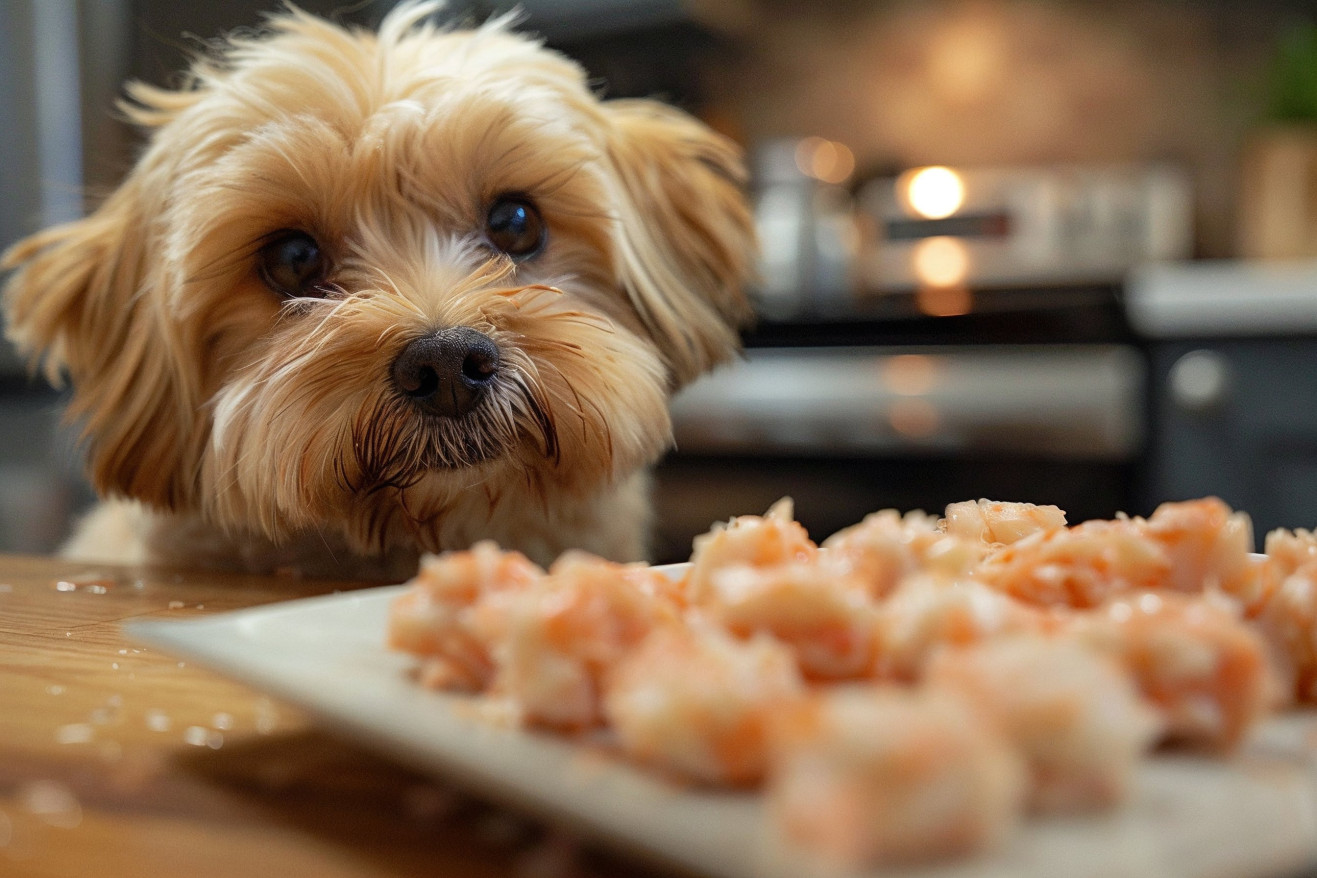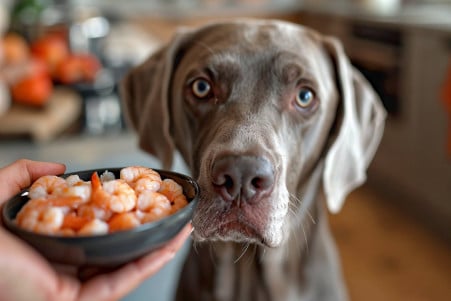Can Dogs Eat Imitation Crab? Understanding the Risks
7 March 2024 • Updated 7 March 2024

Imitation crab is a common ingredient in many meals, but can you share this popular food with your dog? No, dogs cannot eat imitation crab. This is because imitation crab is high in salt and contains several additives that are toxic to dogs, including MSG and phosphates, which can lead to allergic reactions, digestive problems, and other health issues. Instead, stick to treats that are safe for your dog.
This article will take a closer look at the nutritional profile of imitation crab and consider how it may impact your dog’s health based on insights from veterinarians and nutrition research. We will also discuss the additives and preservatives often used in processed foods like imitation crab and their potential impact on dogs.
By summarizing the findings of animal nutrition studies, we hope to provide you with the information you need to make the best choices for your dog’s diet.
Can dogs eat imitation crab?
Evaluating the Nutritional Content of Imitation Crab for Dogs
The main ingredient in imitation crab is surimi, which is often not as nutritionally dense as whole fish. One of the most significant differences between imitation crab and real crab is the nutritional content.
According to Medical News Today, a single serving of imitation crab contains less protein than real crab, with more than double the carbs and only half the protein. Real crab is also full of omega-3 fatty acids and other important nutrients that are not found in imitation crab.
In addition to being less nutritious than real crab, Healthline explains that imitation crab is full of additives and preservatives, including MSG and phosphates, that can be harmful to dogs. These ingredients can cause allergies and other health problems in dogs, who need a diet that works with their unique digestive systems and nutritional requirements.
The lack of essential nutrients like vitamin B12, selenium, and omega-3 fatty acids, which are listed by Dr. Rachael Link in Dr. Axe, in imitation crab could have a big impact on a dog’s health.
Because dogs need a diet that is high in protein and full of essential nutrients, imitation crab is not nutritionally adequate and could lead to deficiencies and health problems.
The Impact of Additives on Canine Health
Additives and preservatives like MSG and phosphates in imitation crab can be harmful to dogs. While these ingredients are common in human food products, they are not always safe for dogs. For example, the RSPCA Knowledgebase explains that sulfur dioxide and sodium and potassium sulfites in these products can lead to thiamine (Vitamin B1) deficiency in dogs, which can result in severe neurological symptoms and even death.
A study in the Australian Veterinary Journal has confirmed that these preservatives can lead to thiamine deficiency in dogs, demonstrating the need for more research into the long-term impact of these additives on canine health. In addition, the RSPCA Knowledgebase notes that the use of sodium benzoate in pet foods is a concern because cats and possibly dogs are more sensitive to benzoic acid than other species.
While regulations like the Australian Standard for Manufacturing and Marketing of Pet Food require pet foods that include these ingredients to also include enough thiamine, products like imitation crab that are not specifically made for pets may not be held to these standards, which could put dogs at risk.
The fact that additives can lead to allergies, digestive issues, and other health problems in dogs makes it important to choose pet foods that meet safety standards and talk to veterinarians about the best way to feed dogs.
How Dogs Digest Food and What They Need in Their Diet
The dog digestive system is a complex and efficient system that is capable of breaking down a wide range of foods. According to PetMD, the digestive system runs from the mouth to the small and large intestines, where food is broken down and converted into energy and nutrients. Dogs’ digestive systems are three times faster than humans’, so what they eat is especially important to their overall health.
Dogs are omnivores, but they have specific dietary requirements. According to VCA Animal Hospitals, dogs need a combination of proteins, fats, and carbohydrates. In addition, dogs need minerals, vitamins, and essential amino acids that are derived from these macronutrients to maintain healthy tissues and support metabolic functions. Dogs can digest carbohydrates because they produce amylase and maltase, which help break down starches and sugars. Dogs can also digest cooked complex carbohydrates more easily.
Feeding your dog seafood, which is high in protein and omega-3 fatty acids, can be beneficial. However, not all seafood is created equal. According to PetCareRx, fish that have shorter life spans are generally safer for dogs because they have lower levels of heavy metals, which can build up in fish with longer life spans and pose a health risk to dogs.
On the other hand, dogs should not eat processed seafood products like imitation crab. These products may not have the same nutritional value as real seafood, and they may contain additives that can cause digestive problems. When feeding your dog, make sure to choose foods that are nutritionally balanced and don’t contain harmful preservatives, and always consult your vet for the best options.
What Vets Say About Giving Imitation Crab to Dogs
Veterinarians urge dog owners to be careful about giving imitation crab to their pets. Although it isn’t poisonous, the artificial ingredients and high salt content in imitation crab make it a poor choice for dogs.
PetMD warns against feeding dogs any food that contains imitation crab because of the mix of seafood, preservatives, and binders. Ollie Blog also notes that the ingredients in imitation crab, including sugar and salt, can cause digestive issues in dogs.
Vets say that if you do give your dog treats, you should do so in moderation and opt for small amounts of fully cooked, unseasoned crab. As the Dope Dog blog points out, it’s important to talk to your vet to get personalized advice about your dog’s diet and to make sure you’re introducing treats like crab in a way that’s safe and healthy.
In short, all of the experts agree that dog owners should avoid imitation crab and choose healthier, more natural treats for their pets. Not only will this help ensure that dogs are eating a healthy diet, but it will also contribute to their overall health and well-being.
Healthy Alternatives to Imitation Crab for Dogs
Thankfully, when it comes to treating your four-legged friend, there are plenty of healthy, dog-friendly alternatives. For example, if you’re looking for a seafood option, consider giving your dog a small piece of plain cooked salmon or whitefish, both of which are full of omega-3 fatty acids and don’t contain any of the unhealthy additives found in imitation crab.
Not only that, but these alternatives also help support healthy skin, a glossy coat, and good joint health, which in turn supports your dog’s overall health.
If you do decide to introduce any new treats into your dog’s diet, it’s important to do so slowly. According to Spoiled Hounds, this means starting with a small amount to make sure it doesn’t upset your dog’s stomach and keeping a close eye on your dog for any negative side effects.
It’s also a good idea to talk to your vet before you make any major changes to your dog’s diet, as they can offer personalized advice based on your dog’s individual health requirements.
In general, it’s important to make sure you’re feeding your dog treats in a way that’s responsible and takes their dietary needs into account. For example, Smart Dog Owners recommends steering clear of treats like imitation crab that contain unhealthy additives and instead opting for whole, natural foods. By making sure you’re giving your dog vet-approved treats, you can make sure you’re prioritizing their health and setting them up for a long, happy life.
Wrapping Up: The Risks Associated with Imitation Crab for Dogs
In summary, the research makes it very clear that imitation crab is not a good choice for dogs. Not only is it high in sodium, but it also contains additives like MSG that make it an unhealthy, unbalanced, and potentially dangerous choice for dogs.
Dogs have very different digestive systems than humans, and their diets should be focused on providing the proteins, fats, and carbohydrates they need without the unhealthy and unnecessary additives that are present in imitation crab.
Veterinary professionals are in agreement that dogs should not be given imitation crab, and they stress the importance of understanding and respecting the dietary and health needs of our pets. For those who want to give their dogs an occasional treat, a veterinarian can offer personalized dietary recommendations that will ensure that the treat is safe and beneficial for the dog.
It’s important for pet owners to always prioritize the health of their pets, and that includes making sure that the treats they give them are nutritious and high-quality.


